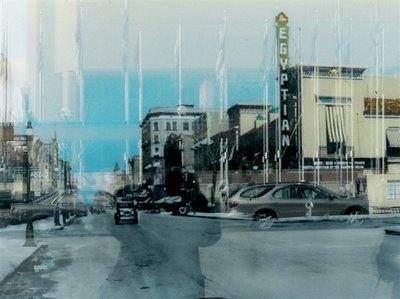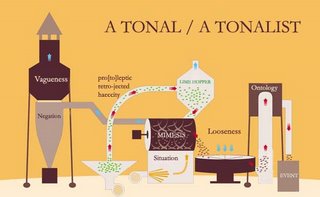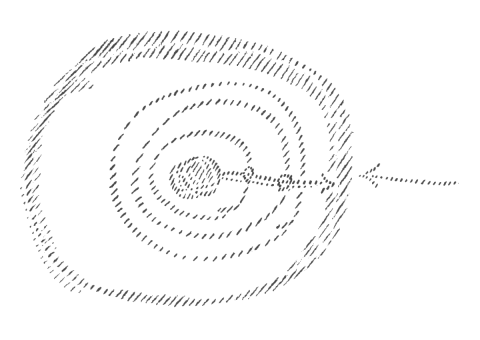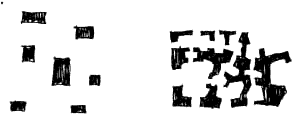
Notes on Notes (A tonalist)
Brent Cunningham
Last week Laura posted a list of A tonalist rules. I’m going to take those as permission for what follows, which are largely speculations in a register more discursive.
I sometimes suffer from a tendency to explain the village to itself. But my intent here is to present this as a description of a real and ongoing relation. I am A tonalist, not the tonalist, problematically neither untonal or tonal. Still I’d like to bring to light some presumptions about the A tonal/ist which my mind is already using to order its thoughts. Not as foundational premises or system, but still inside the tone of consistency.
On that last point, there’s a useful distinction in Alain Badiou’s writing between systematic consistency and systematic unity--the former is positive as long as in relation to inconsistency, while the latter is negative intrinsically. The One and the Whole are Badiou’s sworn enemies; against them he invents Events and the Multiple-without-oneness. As his translators write in a postface, for Badiou "Truth’s transcendence is only ever relative, never absolute; it is the transcendence
from this situation through the unknowable
of this situation." Hence notes on notes.
"Against formal predictability"--one of Laura’s rules. But predictable to whom, against what? Rhyme is not predictable in midst of a novel, say, and may even pass unnoticed. It follows that predictability is always a matter of the intricate construction of surroundings, of the operations of the poem-cosmos. In Laura’s rules all words like "continuity," "coincides," "mitigates," all non-spectacular kinetics tucked into the small motions of prepositions: the idea, I think, is to speak of subtle mechanics towards the geometries of the poem in its true occuring. Laura is perhaps nudging the potential A tonalist rulemaker into the place and diction of the work/s themselves.
A rule, then: Foremost, I take the A tonalist to be grounded in the situational practice of works.
This can sound like a not much original way to displace a question to a new arena. (In the village of critique they wonder how to reach the village of poetry, in the village of poetry they wonder how to reach the village of life, in the village of life they wonder how to reach the village of thought, etc.) But saying the A tonalist is not a pre-determined set of signs, and does not stand prior to the work to declare its specific techniques or artistic values before they are in play and in use--saying that it seeks to withdraw itself from that very debate--may have more significant reverberations than meets the eye. This too is one of Badiou’s better habits: he finds the mere in many ideas that claim radicality, and also the radical in what sounds mere or redundant.
On what empirical basis do I assert this is the quality of the A tonalist? A little of talking to Laura, more of reading, some of listening to some on this blog, more of looking for my own place in what remains Laura’s thought. Yet also in the name itself. To me "tone" is one of the more elusive qualities in the spectrum: certainly it’s the hardest to define and the one high school students are most mystified by in writing. The ambiguity over the a/ in the tonalist further places its science at the far reaches of aesthetic indeterminacy.
Grounded in situational practice: that is, there are no a priori determinations regarding specific use of style, technique, form, order. Importantly, this is not a lack of aesthetic theory. In a sense it is theory theorizing upon theory. The indeterminate is never, here, transcendentally indeterminate: rather it maintains a connection to the determinate of its being claimed in the first place. Just as the unknowable is only and merely something a person may come to know, this indeterminate is something that may very well be tethered to a forthcoming determination.
So this non-declaration of the A tonalist, however wavery, is hence meaningful. If I hold in mind some of the value Language Poetry had for certain poetic manoevers over others, in the name of revolutionary impact and interruption of conventional consciousness, or even when I think of the recent taxonomies of style and method of many Flarfist declarations, it appears more clearly that the A tonalist has a distinct meaning to make. For me this is a meaning that, soundly understood, does not accuse anybody of either pseudo-revolutionary grandiosity or irresponsible aestheticism (the former being the most rote critique of the language poets, the latter the early and already rote critique of Flarf). However it does possess an intuition of an understanding, which is rooted, for me anyway, in what may (for this moment) be different philosophical premises.

Nothing is yet suggested here except a displacement: from the location of critique, onto the location of the artwork. A silly, ironic line may very well be the very thing. For the A tonalist it depends where the line is and what is happening around it or through it. Radical parataxis may be called for. A stanza later it may not. Once again: what are we talking about, where are we, who is writing, what is the situation in the poem-cosmos? This poem-cosmos could even reflect back toward the writer, yes even their biography, anything thinkable, even to the critique itself. But it is indifferent (mere) to critique that establishes a value-system or parameters in its forefront.
It took some contortions not to write "An ironic line may be the best thing to write in a given situation." But I think the A tonalist would question that construction. Even in its own context, the poem does not provide, like a little god, some answer to what belongs at a specific location, it doesn’t teach a person how to write ("if one only listens"). Rather the site of the poem, and each point in its site, is inter-woven to the edges of its cosmos, out to the endlessly fluxuating question of how value judgments take place at all, for anyone. When Badiou argues that poetry thinks, this is what he is saying: the poem is as termed and structured by its contact with the poetry-cosmos as thinking is by its contact with the thought-cosmos.
Two counter-positions or accusations crop up immediately: the first that this idea of the poem as a mini-cosmos is mimetic, hence derivative or secondary, since it is attempting to operate as an autonomous self-generating "nature" or environment which is itself merely the mirror of the "real" nature--presumably made up of groves, oceans, paths, spacedust, grotesque feelings, pleasant feelings, and taxes.
Parallel and intertwined with this critique of mimesis is a critique from the empiricist position (note that the A tonalist, or at least myself as A tonalist, is materialist so more difficult to attack from there). This empiricist critique states that an A tonalist autonomy partakes of a political or ethical irresponsibility all its own, that it’s mere aestheticism to think of the poem as cosmos self-generating in a bubble critique does not condition.
I have complicated responses to both these accusations I’ll try to make brief: in the first case, as I’ve already started to hint, I’d want to make more visible this critique of the Aristotelian trope (art as mirror / mimesis), examine it, and manifest the fact that despite its problems and status as 2,500 year old cliche the mirror has suggestive uses for thinking the poem or artwork. Given the wavery structures of the "nature" reflected therein, it is easy tweak the mirror metaphor to the point where the effective distinctions between the mimetic and non-mimetic begin to break down (not, I need to say, because of the "linguistic turn" Badiou so relentlessly criticizes, but because the relationship is really that fraught with complications in the course of thinking imitation).
There’s more to say there, but moving for now to the second accusation, this is something I’ve been trying to respond to for some time. My own sense of it owes much to the Russian Formalist Viktor Shklovsky and his negotiation of the accusation hurled at him for his theory of the "autonomy" of artworks. But to arrive at Shklovsky requires a detour back through Badiou:
As far as I can tell, Badiou offers what could be, for poetry anyway, an extremely applicable and generative philosophy. It is based on an identification of mathematical thought as ontology that owes much to Cantor’s set theory, much to Plato, some to Deleuze, and a lot to a critique of empiricist presumptions latent in much 20th century "post-modern" thought, including (according to AB) Deleuzian thought. To get philosophy on a footing neither neo-empiricist but not unaware of the valid critiques of idealism (especially the critique of the One and the Whole), Badiou feels he must "subtract" philosophy from its claims on the theory of knowledge and the theory of being. But this leads him (and maybe this is intrinsic to any neo-Idealist project no matter how nuanced) to the idea that philosophy is perfectly justified to construct "for everyone" the "common shelter" where truths (relative maybe, but still truths) take place. And indeed Badiou turns out to be quite serious in his attempts to represent the "true" events that take place in the untethered history of poetry, distinguishing these from the meaningless or mistaken gestures of other poets and poems, and taking on the task of representing the works of true resonance for thought and "for the era." The result is Badiou, seemingly without much awareness of the current terms of poetry (no mention of Hocquard, Collobert, Cadiot, or any living poet), making stark claims for arts and writers, and most especially for "the poem." While philosophically coherent, naturally, and even resonant with his ideas, his claims are practically suffocations for anyone wishing to actually think their relationship to writing in the course of creating that writing: "The poem does not consist in communication. The poem has nothing to communicate...The poem is a purity folded in upon itself. The poem awaits us without anxiety."
To me this is the opposite of the A tonalist, which sees that these statements could be true in a given poem-cosmos, as situation of a specific order or logic of the work, but would never prescribe as either its first or last gesture of enactment. To put it succinctly, the problem is most obvious where Badiou claims the poem "presents itself as a thing of languague, encountered--each and every time--as an event." The A tonalist, on the other hand, would instead argue that Badiou’s understanding of the entirety of being (where not every moment can be an "event") would be the more exact view of the poem-cosmos: there are soft spots, errors, confusions, wanderings, all as the background for periodic, emergent events.
The reason for Badiou’s declarative totalizing stems from his neo-Idealistic view of event wherein, for something to appear, it must (in my words now) have the analytic and formalizable elements that grant it both temporary universality and a border that can thus acknowledge the depth/reality outside itself. Otherwise, as with Delueze’s open and closed models, Badiou sees a danger of nothing much happening except an endless dissipation without the subtraction that is elemental to production of a truth.
To me, in poetry the counter examples spring readily to mind. Take the American poet-theorists: Williams, Stevens, Stein, Spicer, Duncan, Susan Howe. Almost anyone engaged in the making of works can now have analytic and formalizable declarations (either in poems or in critical essays) which are meanwhile striated and complicated by the existence and interplay of their poem-cosmos in its "shamelessness" (as Laura puts it).
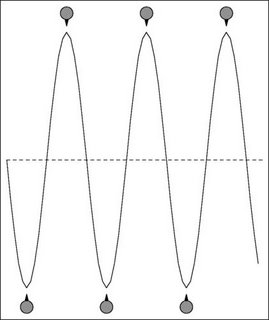
This is equally true of Shklovsky. What he and Russian Formalism effected was, to my mind, on the one hand similarly analytic and formalizing, hence actual, but able to preserve the entrypoint of writers and readers into the works. And not only due to the existence of Shklovsky’s own writing but also in its relationship back into his theories. Shklovsky first of all connected the measure of the artwork to the production of moments of "enstrangement," which amounts to any vivifying effect on the reader and is pointedly a matter of context of readerly experience (whereas the reader, in Badiou, basically disappers as an experiencing creature to make room for the constant event). At the same time Shklovsky either gave no fixed rules for production of that vivifying effect, or made those rules so papery and axiomatic--polemical, declarative, unargued--that they appear as the obvious product of a singular commentator, without foreclosure of new applications or counter-truths. This is closer, as I read it, to what Badiou claims to value broadly and what his idea of multiple, relative truths seems to offer. Surely AB has the means to support his position from the point of view of his entire system (where it is mathematics, not poetry, that actually shows the multiple-without-oneness to the era), but I still see him missing an opportunity to subtract philosophy, in just such a papery manner, from its grandiose task as procuress of the truth of poetry.
With all that in mind, turning now back to the question of the political, I first of all see the A tonalist as proposing the autonomy of the artwork foremost as a mere displacement of the critical domain: that is, the political could very well be engaged, its questions voiced and in cases possibly answered, during the course and logic of the poem--nothing is foreclosed there. But even if or when the A tonalist refuses that sort of political motion, and does not call back to the politics of discursive critique, it is done in such a stark and unmistakably formal/mimetic way that its paperiness is visible, as is its source in a particularized claim (ok: a person) that does not forego the possibility of others outside of its situation. This, I would say, in fact opens political possibility by viewing "this" moment as not always a political moment, which in turn grants the possibility that a moment for action could really arrive in all its necessity and demand. At least it argues that such action is not foreclosed by the finally dissipating and zeroing idea that holds all actions at all times and places to be political.


